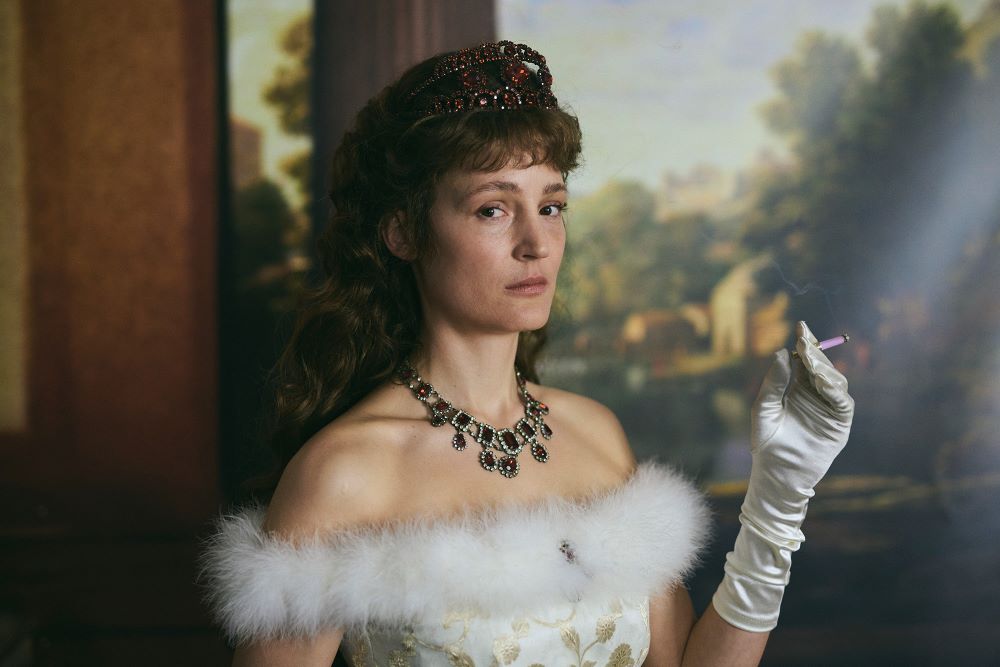
Period films, especially biopics featuring a famous historical figure, can start to blur together. They’re never revolutionary, always follow the same formula, and the only thing viewers discuss at the end is how great the costumes were. But Corsage is different. This internationally co-produced historical drama by writer/director Marie Kreutzer was practically designed to reverse the usual stereotypes of the genre, with a rare unique take on the story of the 19th-century Empress Elisabeth of Austria.
In Austria, Empress Elisabeth is an obsession. Her life has been retold countless times through films and books, and her face is reproduced onto every touristy knick-knack. Most famously, she was the topic of the ‘Sissi’ film trilogy, a soapy, rose-tinted series created in the 1950s — a portrayal that Corsage rebels against. Instead, it’s a fictionalised account of the year the empress turned 40, when society decided she had become an ‘old woman’ and she began to retreat from the public eye.
Corsage was riveting, a film that followed a slow passage of time without wasting a moment. Every scene — whether it was Elisabeth submerged in a bathtub, smoking while standing for a portrait, or red-faced and exercising on a wall bar — was important and added insight into her character. And her character was fascinating. Portrayed by the impressive Vicky Krieps, the empress was imposing, steely, and entrancing to watch. This version of Elisabeth (which couldn’t be further from the G-rated 50s iteration), was a selfish, angry, sexual being, and a refreshingly complex portrayal of a historical woman.
The film constantly deviated from expectations, using dry humour to add surprising moments and avoid the usual stale pace of indie historical dramas. It had a sarcastic undertone, illuminating the performative nature of the time through subtle hints — like showing the characters’ fake teeth, wigs, and stick-on sideburns. Also, the dialogue had many darkly funny lines, for instance ‘I forbid you to drown in my lake, it’s my lake’.
Corsage was produced with an inherently female perspective. Many of the scenes had an erotic quality but directed by Kreutzer, they came across completely differently than those produced with the traditional male gaze. Elisabeth had a few romantic interactions throughout the film, but none had any unnecessary sexual actions or nudity, and when they were included, it felt realistic. One such moment was with her English riding instructor (Colin Morgan), where their intimacy was used to explore Elisabeth’s desire for admiration. It wasn’t choreographed to appeal to a man. And it was still beautifully sensual.
The German word ‘corsage’ translates to ‘corset’, and this restrictive, suffocating piece of clothing was not only a literal focus in the film, but also a metaphor for the confinement of the empress’s life. Elisabeth’s struggles with body image and ageism, as well as the limiting societal expectations of her role, will be relatable for any woman. These themes were explored viscerally in the film and it was immensely satisfying.
Some parts of the empress’s rebellion (such as raising her middle finger to a room full of dignitaries) were obviously fictionalised, but others are true. She did smoke, have a tattoo, ride her horse at breakneck speed, and avoid her court by travelling for long periods of time. Corsage just takes it a bit further and magnifies her increasing disillusionment, creating an imagined ending that highlights the relevant parts of her story.
Amongst a plethora of dull, unoriginal historical stories, Corsage stands out as an unapologetic film with a transformative female perspective and a rebellious heart. For anyone who has ever felt trapped by the expectations of others, it’s a truly liberating experience.
![]()
![]()
![]()
![]()
![]()
FIVE STARS (OUT OF FIVE)
As part of the Perth Festival, Corsage is showing from 28 November to 4 December at the UWA Somerville Auditorium.
